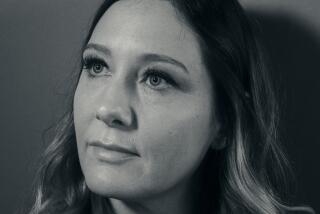Review: A moving story of grief in the wild, Robin Wright’s directing debut doesn’t fully ‘Land’
The Times is committed to reviewing new theatrical film releases during the COVID-19 pandemic. Because moviegoing carries inherent risks during this time, we remind readers to follow health and safety guidelines as outlined by the CDC and local health officials. We will continue to note the various ways readers can see each new film, including drive-in theaters in the Southland and VOD/streaming options when available.
The seasons pass swiftly in Robin Wright’s “Land,” a visually pristine, emotionally obvious drama in which time flies and heals some but not all wounds. A story of implacable grief giving way to tentative hope, the movie follows a desperately sad-eyed woman named Edee (Wright) deep into the mountains of Wyoming, where she begins a life of solitude for reasons that are at once intensely private and not especially hard to figure out. As the years fall away, marked by cycles of autumn leaves, winter icicles and other natural wonderments, Edee’s emotional shell begins to fall away too, and on a similarly predictable schedule.
We first meet Edee as she’s making her way up the mountain, stopping briefly in town to gather supplies, load up a U-Haul and toss her cellphone, mid-ring, into the trash. She’s done with other people, as becomes clear when she arrives at a remote cabin in the woods, an edge-of-the-world perch that suggests her seeming indifference to whether she lives or dies. But while Edee can cut herself off from any contact with the outside world, she can’t short-circuit her painful memories — namely, the apparitions of her husband and young son, their happy smiles frozen in ignorance of whatever mysterious tragedy awaits them.
Other things Edee can’t do, apparently: hunt, chop firewood or keep a hungry bear from devouring her rations. Ursine visitors aside, “Land” is decidedly not “The Revenant,” as wilderness survival stories go, and I mean that largely as a compliment. Wright and her cinematographer, Bobby Bukowski, aren’t interested in rubbing the viewer’s nose in mud and viscera, and while Jesse Chatham’s screenplay makes similarly strategic use of tragedy as a narrative device, Edee is not motivated by a desire for revenge. Initially, the movie pushes more in the direction of “Wild,” another portrait of an emotionally bereft woman seeking refuge in extreme isolation, but Chatham’s more linear story has little of that movie’s bristling, time-hopping energy.
Wright, making her feature filmmaking debut (after years of directing episodes of “House of Cards”), seems keen to pare away essentials and steep us, for a while, in the tough rituals of everyday survival. The physical details are properly transporting, from the gloomy outhouse that greets Edee upon arrival to the cacophonous animal sounds that fill the air on her first night. (The movie was mostly shot, under suitably difficult conditions, on Moose Mountain near Banff National Park, in Canada’s Alberta province.) As lashing rain gives way to falling snow, the scenery gets prettier and incrementally more lethal. The near-death experiences that befall Edee in quick succession — that brush with the bear, the growing likelihood of death from exposure or starvation — grow naturally out of her harsh environs, even as they suggest an almost metaphysical intensification of her grief.
For all Wright’s skill at marshaling resources across this physically demanding production, it’s her unsurprisingly precise, delicate work in front of the camera that gives this story its initial pull. Edee may no longer want (or know how) to live, but her survival instincts inevitably kick in, sometimes against her own will. Instincts alone aren’t enough, of course, and “Land” would likely be even shorter than its fleet 89-minute running time were it not for the arrival of Miguel (Demián Bichir) and Alawa (Sarah Dawn Pledge), passing Good Samaritans who nurse Edee back to health. Miguel sticks around for a while and comes back every so often, briefly raising the specter of romance. But his growing bond with Edee remains both platonic and practical-minded, as he replenishes her dwindling supplies and teaches her the basics of wilderness survival.
The specifics of the situation are only faintly sketched in; there are passing references to a nearby Indigenous reservation where Alawa lives and works as a nurse and to which Miguel delivers clean water. But while Bichir’s low-wattage charm makes Miguel a calming presence — he and Wright have a touching, bittersweet rapport — there’s never any real doubt or mystery about the narrative function he serves here. He’s there to coax Edee away from the edge of the cliff and hold up a mirror to her own tragedy, to provide a sympathetic shoulder even if she isn’t quite ready to cry on it yet. He’s also there to sing along to Tears for Fears and his other ’80s pop favorites, an amusingly awkward detail that would be more endearing if it didn’t feel so calculated to endear.
And it’s that calculation that finally makes “Land” play more like a tidy, tactful study of physical endurance and emotional recovery than a fully sustained immersion in Edee’s experience. The film’s beauty is undeniable, but it remains a pictorial, surface-level kind of beauty, one that glosses over the muck and sweat of its protagonist’s various second-act breakthroughs, whether she’s planting a garden or gutting her first carcass. Here and elsewhere, the therapeutic power of nature is treated as a given, rather than a genuinely life-altering discovery. “Land” is a movie of hard truths that go down a little too easily, a story as terse but never as elemental as its title.
‘Land’
Rated: PG-13, for thematic content, brief strong language and partial nudity
Running time: 1 hour, 29 minutes
Playing: Starts Feb. 12, in general release where theaters are open
More to Read
Only good movies
Get the Indie Focus newsletter, Mark Olsen's weekly guide to the world of cinema.
You may occasionally receive promotional content from the Los Angeles Times.











